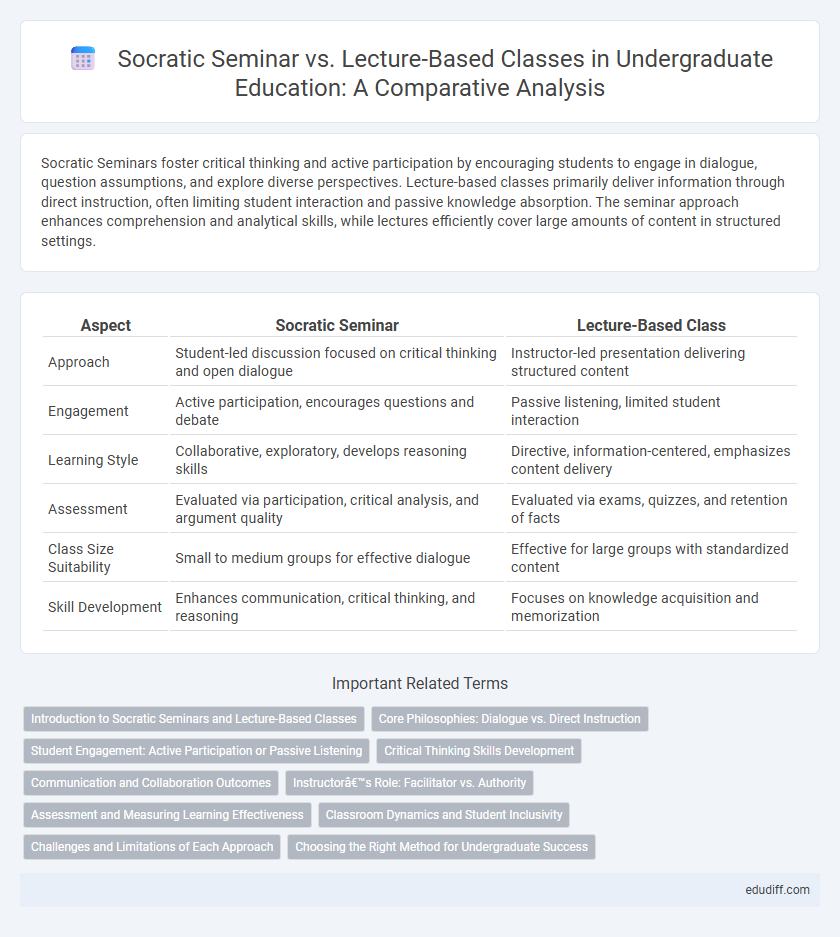Socratic Seminars foster critical thinking and active participation by encouraging students to engage in dialogue, question assumptions, and explore diverse perspectives. Lecture-based classes primarily deliver information through direct instruction, often limiting student interaction and passive knowledge absorption. The seminar approach enhances comprehension and analytical skills, while lectures efficiently cover large amounts of content in structured settings.
Table of Comparison
| Aspect | Socratic Seminar | Lecture-Based Class |
|---|---|---|
| Approach | Student-led discussion focused on critical thinking and open dialogue | Instructor-led presentation delivering structured content |
| Engagement | Active participation, encourages questions and debate | Passive listening, limited student interaction |
| Learning Style | Collaborative, exploratory, develops reasoning skills | Directive, information-centered, emphasizes content delivery |
| Assessment | Evaluated via participation, critical analysis, and argument quality | Evaluated via exams, quizzes, and retention of facts |
| Class Size Suitability | Small to medium groups for effective dialogue | Effective for large groups with standardized content |
| Skill Development | Enhances communication, critical thinking, and reasoning | Focuses on knowledge acquisition and memorization |
Introduction to Socratic Seminars and Lecture-Based Classes
Socratic seminars emphasize critical thinking and dialogue, engaging students in open-ended questions for deeper understanding. Lecture-based classes prioritize direct knowledge transfer, where instructors deliver content systematically. Both methods offer unique benefits, with seminars fostering interactive learning and lectures providing structured information.
Core Philosophies: Dialogue vs. Direct Instruction
The Socratic Seminar centers on dialogue and critical questioning, encouraging students to actively engage in collaborative exploration of ideas. Lecture-based classes prioritize direct instruction, where the teacher transmits knowledge and students primarily receive information passively. This contrast highlights the philosophical difference between fostering independent thinking through discussion and emphasizing structured content delivery.
Student Engagement: Active Participation or Passive Listening
Socratic Seminars foster student engagement by promoting active participation through dialogue, critical questioning, and collaborative thinking, encouraging deeper comprehension and retention of material. Lecture-based classes primarily rely on passive listening, where students absorb information but have limited opportunities for immediate interaction or critical reflection. Research shows that active learning environments, like Socratic Seminars, significantly enhance student motivation, analytical skills, and overall academic performance.
Critical Thinking Skills Development
Socratic seminars enhance critical thinking skills by encouraging students to engage in thoughtful dialogue, analyze diverse perspectives, and construct well-reasoned arguments. Lecture-based classes often emphasize information delivery and passive listening, which may limit opportunities for active critical analysis and problem-solving. Research shows that students participating in Socratic seminars demonstrate improved abilities in critical reasoning, reflective thinking, and intellectual curiosity compared to traditional lecture settings.
Communication and Collaboration Outcomes
Socratic Seminars promote active communication and critical thinking by encouraging students to engage in dialogue, question assumptions, and build on peers' ideas, resulting in enhanced collaboration skills. Lecture-Based Classes primarily involve one-way information delivery, often limiting student interaction and reducing opportunities for collaborative learning. Research shows that Socratic methods improve verbal articulation and teamwork, fostering deeper understanding through shared discourse.
Instructor’s Role: Facilitator vs. Authority
In a Socratic Seminar, the instructor acts as a facilitator who encourages critical thinking by guiding student-driven dialogue and promoting open-ended questions. In contrast, a lecture-based class positions the instructor as an authority who delivers structured content and controls the flow of information. This shift in the instructor's role significantly impacts student engagement and the development of analytical skills.
Assessment and Measuring Learning Effectiveness
Socratic seminars emphasize formative assessment through student dialogue and critical thinking, encouraging self-reflection and peer feedback to measure understanding. Lecture-based classes typically rely on summative assessment methods such as quizzes, exams, and essays, which evaluate retention and comprehension of delivered content. Assessing learning effectiveness in seminars focuses on depth of analysis and reasoning skills, whereas lectures prioritize content mastery and recall accuracy.
Classroom Dynamics and Student Inclusivity
Socratic seminars foster dynamic classroom interaction by encouraging critical thinking and active participation, enhancing student engagement and inclusivity through dialogue-driven learning. Lecture-based classes primarily deliver content passively, which may limit student interaction and reduce opportunities for diverse perspectives to emerge. Emphasizing collaborative discourse in undergraduate settings promotes deeper understanding and accommodates varied learning styles more effectively than traditional lectures.
Challenges and Limitations of Each Approach
Socratic seminars face challenges such as uneven participation and reliance on students' critical thinking skills, which may hinder those less confident or prepared. Lecture-based classes limit interactive engagement and critical analysis, often resulting in passive learning and reduced retention. Both approaches require careful adaptation to address diverse learning needs and maintain student motivation effectively.
Choosing the Right Method for Undergraduate Success
Socratic seminars promote critical thinking and active student engagement by encouraging dialogue and questioning, which enhances deep understanding of complex undergraduate topics. Lecture-based classes efficiently deliver structured content to large groups, providing essential foundational knowledge and clear learning objectives. Selecting the appropriate method depends on course goals, with seminars ideal for developing analytical skills and lectures suited for acquiring core information quickly.
Socratic Seminar vs Lecture-Based Class Infographic

 edudiff.com
edudiff.com